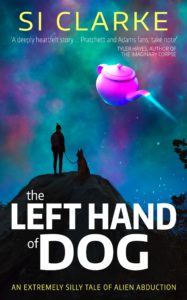
Each of my teammates in the second annual Self-Published Science Fiction Competition (SPSFC2) have evaluated their initial allotment and have made their recommendations for the quarterfinals, which consist in our collective top eight of the 28 books in our team’s slush pile. Four of those eight quarterfinalists had been in my scouting allotment, so I personally had four new quarterfinalists to read. And one that had caught the fancy of all three of my teammates was The Left Hand of Dog by Si Clarke.
The Left Hand of Dog follows Lem, a trans sci-fi nerd who sets out on an adventure in the Canadian outdoors that is quickly cut short by the alien abduction of her and her dog Spock. And if they ever want to see home again, they must join forces with other prisoners from disparate races to outwit their bunnyboo captors and extricate themselves from an interstellar teapot.
The plot summary has more than a few hints of Douglas Adams, and they’re only strengthened by the “Adams fans, take note” splashed across the cover. But while the setup has plenty of Adams-style sci-fi silliness, the heart of the story feels much more of a piece with Becky Chambers, with found family, acceptance, and stumbling through interspecies communication as the ultimate focal points.
And this leads to what I found to be the book’s chief flaw: the tonal dissonance between the Adams and Chambers styles. To be sure, both fall under the general lighthearted umbrella that eschews the common sci-fi focus on massive conflicts, but Adams avoids bogging down in big wars by taking nothing seriously, whereas Chambers simply takes the small character moments seriously. And while it’s certainly possible to have poignant personal arcs in an irreverent, lighthearted tale (hello, Pratchett!), the silliness and the seriousness work against each other in a way that makes it difficult to pull them into harmony.
Labeling Lem’s captors as “bunnyboos” immediately signaled to me that there was no real danger, to the point that it took me a couple chapters to even realize the bunnyboos were hostile. And the universal translator’s “figurative” setting started as a vehicle for stuffing the narrative with pop culture references and seemed to flit back and forth between serious communication tool and vehicle for jokes. Undoubtedly, communication across species is a topic ripe for both serious and humorous misunderstandings, and I often enjoy both aspects. But in this case, the switches between total understanding and wild miscommunication seemed too haphazard to set up the serious conversations about sex and gender to occur later in the book.
The sentence-level writing makes for an easy read, enough of the jokes landed to earn a couple chuckles, and there are the makings of a solid found family tale in the back half of the book. But the poignant, found family moments don’t have enough room to breathe amidst the squeeze of comic relief. And between the intermittent translation issues and one character whose mode of dialogue made her impossible to take seriously, the heartfelt passages feel more like odd interludes than the true core of the story. Overall, many of the pieces are there for a quality tale, but they don’t quite come together for a satisfying whole.
Recommended if you like: silly space operas emphasizing acceptance and not worrying too much about consistency.
Can I use it for Bingo? It’s Self-Published and Set in Space.
Overall rating: 10 of Tar Vol’s 20. Two stars on Goodreads.
SPSFC Score: My personal score is 5/10. The official team score will be decided in concert with my teammates.
